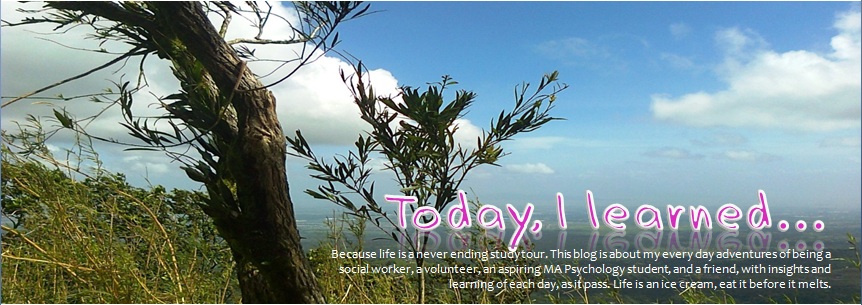Fair trade is for me, an advocacy, an ideology and a practice.
ADVOCACY
It advocates for equality between the maker and consumer by giving a venue to where the maker could dialogue with the consumer about the price. The essence of price in fair trade is "what would be fair for the makers". It is contrary to the present system of rice farmers, coconut farmers and fisher folks who harvest and sell (equal to being maker) but are not the ones pricing their product, BUT the consumer. Imagine yourself going to the mall, looking for something you want to buy and telling the cashier "I'll buy this for P5.00 only". It's impossible and maybe a not so good joke for April Fool's Day but, what a horrible situation for our fellow agricultural fellows.
Fair trade lets the maker get out of this horrible situation, by explaining to the consumer the maker's background. It is advocacy for justice and equality in economic systems and policies.
Another thing that fair trade advocates for is "going green" or "going organic". Contrary to commercial agriculture, fair trade puts importance in environmental sustainability by doing it "the natural way."
IDEOLOGY
Fair trade in itself is an ideology. "Fair trade" is a debate and a proposal to the economic policy of "free trade" implemented in our societies presently. Free trade speaks of equality beautifully in paper such as "Philippines and Japan can fish on each other seas freely" but in reality, "How can a Filipino fisherman fish with his small banca in the seas of Japan?".
PRACTICE
It puts ideology into practice by implementing democracy and justice between the maker and consumer in their relationship. It might be seen as little, as in a micro view but if all consumers and makers have this kind of relationship, capitalism would be in the brink of perishing.
and today I learned that... I have to read more about economics, free trade and fair trade.
because it directly affects the lives of people in poverty.
Recently, I got more interested with fair trade, and probably, would start efforts for fair trade in the nearby future. There are plans to connect with makers of handicrafts for my hometown and selling it in Japan. The internet would be the first step. From then, let's see what happens. For now, I'm helping with the fair trade program of ACCESS.

[Earrings and necklace pendant made from coconut.]
Fair Trade Product: Handicrafts made from buri and handicraft
Fair trade Group: Mapayapa (7 mothers) from Perez, Alabat Island Quezon
Market: Japan and Manila (bazaars, schools, bookstores, fair trade shops)
Today, I met with my friend, Teresa and she bought Mapayapa products. <3 Maraming salamat!
Fair trade Group: Mapayapa (7 mothers) from Perez, Alabat Island Quezon
Market: Japan and Manila (bazaars, schools, bookstores, fair trade shops)
Today, I met with my friend, Teresa and she bought Mapayapa products. <3 Maraming salamat!

["It's difficult to decide". They are all so cute. <3]

[Ter also promised me... that she'll be the model of Mapayapa goods in their office. :D
It is not only the cuteness and uniqueness that we'll be introducing to consumers,
it's the "cause" of the fair trade project.]
I hope I can do more for fair trade in the coming years!
Teresa's blog:
Nayukichi's blog (Japanese participant of ACCESS Spring Tour) pioneering "See-saw" Fair Trade Circle:
The pioneer of fair trade fashion:

No comments:
Post a Comment